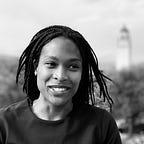Power Posse
When I took Paths to Power with Jeffrey Pfeffer last quarter, I was skeptical. These words from Chimamanda Ngozi Adichie, made pop culture famous by Beyonce’s Flawless, kept ringing in my ears.
We say to girls
“You can have ambition
But not too much
You should aim to be successful
But not too successful
Otherwise you will threaten the man”
-Chimamanda Ngozi Adichie, We Should All Be Feminists
Replace “girls” with any marginalized group, and “man” with the group doing the marginalizing, and now you have an understanding of all insidious power dynamics. It’s not that the marginalized group can’t have anything, they just can’t have it better. Given that one’s level of power is a relationship to others, could I, a person with two God-given, beautiful, pride-inducing, yet marginalized identities,¹ truly wield power? And even if I could obtain this so-called power, would I want it? Power was something that people used to make themselves feel big and others small — not something I was interested in doing.
Pfeffer addressed many of my fears in his opening class. “I’ve been told that my class doesn’t address women or people of color specifically, but I’ve found that these tools work for everyone. You may have to dial up or down the power tactics, depending on who you’re talking to. But you can’t control who you’re talking to, only what you do.”
So, it was true — the class wouldn’t specifically address power in relation to identity. I could shy away from people’s potential negative reactions to the new power tactics I wanted to try, or I could engage and adjust. I chose the latter, and I’ve now come around far enough to have started a group of women — Power Posse, for which this piece is named — that revisits the class’ learnings throughout spring quarter.
My shift in thinking, along with a few tactics I learned in class, led me to find my own Path to Power in a fairly normal situation during winter quarter. Before class, the speaker — a young, pioneering, CEO² — hosted a breakfast. Normally, I would’ve talked to a friend, but instead I introduced myself and made light chatter with him. Normally, I would’ve sat across the table, but instead, I sat right next to him. And normally, I would’ve walked to class checking emails, but instead, after the breakfast, I walked the guest to class and told him what parts of his company I was interested in. I walked away with his email address, and later, an invitation to visit his company for a day, and when I visited, a few unsolicited job offers from various teams.³
My gender and race weren’t factors in my conversation with this CEO, and I liked that I could exert influence by simply being myself with a little more boldness. I discovered that power is not a goal in and of itself, but is best used as a tool to achieve other goals — an invitation to speak at a panel, a job offer, etc. Power has a purpose. I wanted to keep these power learnings with me after winter quarter — but how?
Enter Power Posse.
Inspired by Arielle Ziv, MBA ’19 who started a weekly women’s group at Facebook to engage in Paths to Power learnings, my classmate Marta Milkowska and I did the same. We formed a group of 8 GSB women who are working on individual “power projects”⁴ for the quarter. One member coined us “Power Posse,” and the name stuck. We meet weekly to discuss our individual projects, ask for and give help, engage in exercises to help us understand our own power, and share stories around different power tactics from Pfeffer’s book, Paths to Power.
Nothing I say about why I love this group will come as a surprise.
- Power Posse is both my safe space to discuss my feelings and my kick in the butt to go beyond what I think is possible for myself.
- I now have a group of confidants to text about business decisions. Yes, I can do this with individual friends, but what if they just want to chill? I know I can always contact this group of women with power work or life decisions I want to make.
- Seeing each woman go through their own power projects has opened my eyes to the ways in which other people exert influence and power. I am learning not only through the discussions we have each session, but by watching what other women have done and putting their actions in my own toolkit.
I will always have a power posse. The people in it may not always share a specific aspect of my identity, but we’ll have each other’s backs and push each other to be bolder. It is the best opportunity I can create for myself to hold my power and my identities together.
Interested in creating your own Power Posse?
Marta and I started our power group with women in our class who we knew were interested in Paths to Power learnings, but we’re actively thinking about how to make the pilot we built more scalable. We are writing down our learnings and will publish them in June. Email me for more information in the meantime!
Endnotes
- I am a black woman 😍.
- Class is confidential, or I’d tell you who it was.
- This paragraph is a case of Power Posse in action. I almost took it out because I was nervous I would seem like I was bragging. Power Posse encouraged me to own it and leave it, so here it is!
- In the Paths to Power class, each student has to work on a “power project.” This is a project that the student pursues using power tactics learned from the class.
